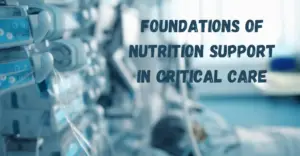In critical care settings, providing optimal nutrition support is a complex yet crucial aspect of patient care management. Patients in intensive care units (ICUs) often have unique nutritional needs due to the severity of their illnesses, which can complicate the delivery of adequate nutrition. Here, we explore the primary challenges of nutrition support in critical care and discuss strategies to overcome them for better patient outcomes.
1. Assessing Nutritional Needs
Challenge: Accurately assessing the nutritional needs of critically ill patients is challenging due to the dynamic nature of their conditions. Traditional methods, such as indirect calorimetry, are not always feasible in the ICU.
Solution: Implementing a combination of clinical judgment and predictive equations, while utilizing available technology like metabolic carts when possible, can help provide a more accurate assessment. Regularly re-evaluating nutritional needs as the patient’s condition evolves is also essential.
Timing of Nutrition Support
Challenge: Determining the appropriate timing to initiate nutrition support can be difficult. Early initiation is often beneficial, but the patient’s hemodynamic stability and gastrointestinal function must be considered.
Solution: Current guidelines suggest starting enteral nutrition (EN) within 24-48 hours of ICU admission for patients who are hemodynamically stable. Close monitoring is crucial to adjust the plan based on the patient’s response and condition.
4. Gastrointestinal Tolerance
Challenge: Critically ill patients often experience gastrointestinal dysfunction, which can hinder the tolerance and effectiveness of EN.
Solution: Strategies to improve tolerance include using prokinetic agents, adjusting the feeding regimen (e.g., continuous vs. bolus feeding), and selecting appropriate formulas. Progression to post-pyloric feeding is appropriate when the above strategies do not yield desired outcomes Regular monitoring for signs of intolerance and timely intervention are key.
5. Metabolic Complications
Challenge: Patients in critical care are at high risk for metabolic complications such as hyperglycemia, refeeding syndrome, and electrolyte imbalances.
Solution: Careful monitoring of blood glucose levels, electrolytes, and other metabolic parameters is essential. A gradual increase in nutrition, particularly in malnourished patients, can help prevent refeeding syndrome. Individualized nutrition plans should be regularly adjusted based on the patient’s metabolic response.
Conclusion
Nutrition support in critical care requires specialized management with the dietitian as an integral member of the interdisciplinary team.
Staying updated with the latest guidelines and research, alongside continuous education and training, equips healthcare professionals to navigate these challenges effectively, ensuring that patients receive the best possible nutrition support during their critical care journey.




